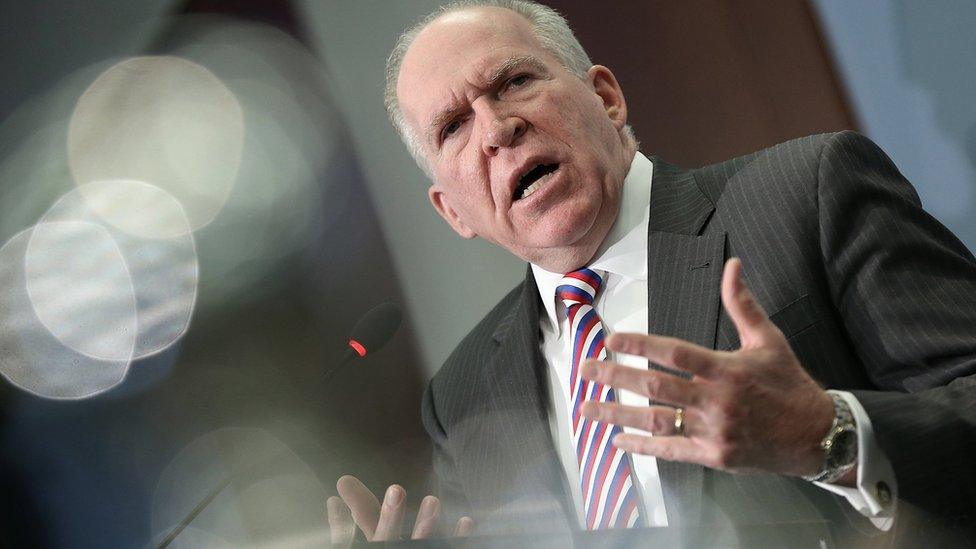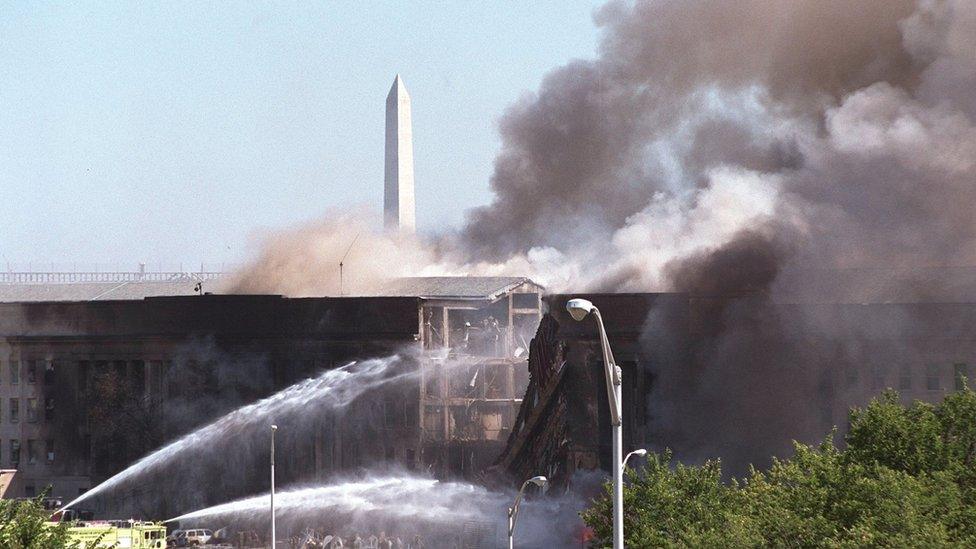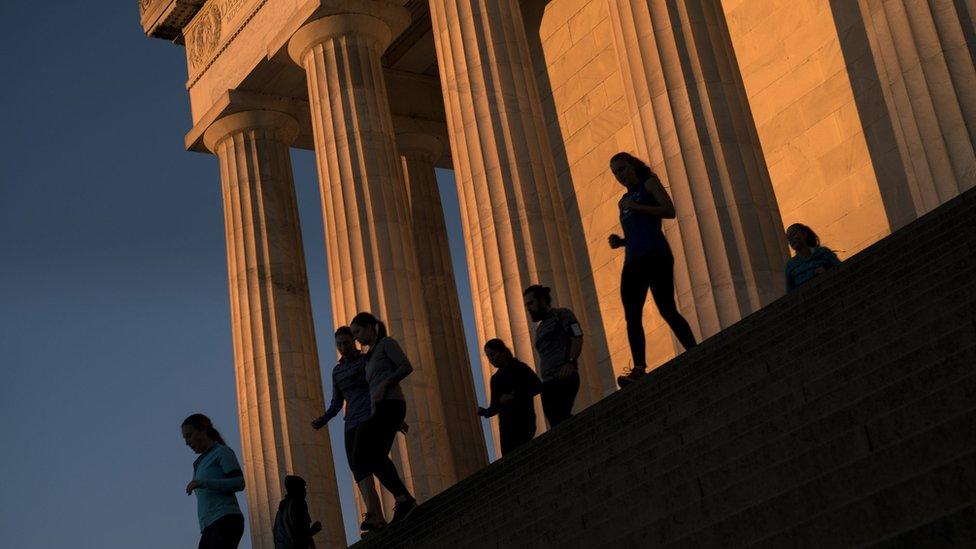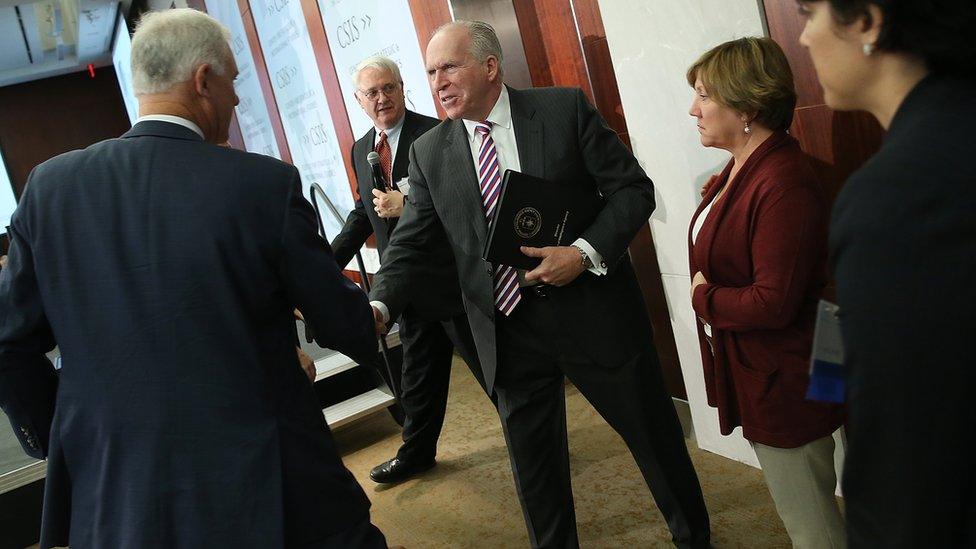Questions about US safety after Paris attack
- Published

CIA Director John Brennan says IS attacks outside of Iraq and Syria were "inevitable"
People in Washington wonder whether they'll become targets for the Islamic State group. The threat level is hard to determine, but the anxiety is real.
Reading from notes in a thick, black folder, CIA Director John Brennan said at a Washington think tank on Monday it was "inevitable" that the so-called Islamic State (IS) would come up with ways to kill people outside of Iraq and Syria.
He said intelligence officials were working "feverishly" to stop them from carrying out their plans.
The threat from IS militants has existed in the US for some time. But worries about a possible assault have ratcheted up over the past several days - first by the Paris attacks that were apparently carried out by IS, killing 129 people in a night of carnage, and then from a new IS video promising a "crusader campaign" against the US and other countries.
IS militants have made similar threats before, as US intelligence officials tell me. This time, however, the militants are more specific, saying they'll go after people in Washington.
For that reason some of the people in the auditorium at the Washington think tank, the Center for Strategic and International Studies, were jumpy on Monday. Many had been in town on the morning of 11 September 2001 when al-Qaeda attacked New York and Washington.

The memory of 9/11 is still strong for many in Washington
It didn't help that streets outside the think tank were blocked for part of the morning. A woman had fired several shots in the early morning hours, a police officer told me. She was facing a "mental health crisis", according to local media, and was taken into custody.
One of the windows in a building on L Street, several blocks away, was shattered from a bullet. The glass looked as if were covered in frost, and police tape had been wrapped around orange cones and an empty Politico newspaper stand.
The gunfire had nothing to do with IS, but it added to the anxious mood at the think tank and in other parts of the city, too.
Intelligence officials and experts say the threat from IS is different than the one posed by al-Qaeda. It's hard for analysts to even determine how serious the threat is, and to what extent people in Washington and other US cities should be concerned.
IS itself is relatively new, at least from a research standpoint, and the data is murky.
People from the US have gone to Syria to fight with militant groups and could theoretically bring the fight home.
In a new report, external, researchers at New America Foundation, a public-policy institute, identified 23 US citizens who have travelled to Syria with the intent of joining the IS or other jihadi groups. Of these Americans, nine are dead, five are in custody and the others remain at large.

Still the researchers, who've studied the individual cases carefully, said they believe the threat from these Americans is relatively low.
More troubling, said the researchers, is the possibility of individuals living in the US and have never been to Syria - or individuals who can easily come here - who are drawn to the Islamic State group's message and decide to carry out an attack.
With that goal in mind, IS militants have published a guidebook, How to Survive in the West, for those who want to travel to the West and become a "secret agent". The guidebook offers instructions for making bombs, hiding weapons and using Jason Bourne-like methods of escaping detection.
During the conference, former national security advisor Henry Kissinger looked around the room at the Italian ambassador and other dignitaries and said half-joking it was "a perfect setting for a suicide" - a potential target for a militant.
Others in the room felt the same way.
"I'm wondering - how come he's here?" said a former Pentagon official in the auditorium, referring to Mr Brennan. The former official said he wished the CIA director had been in his office that morning, trying to prevent an attack, rather than giving a speech.
Yet others at the conference said the Islamic State group couldn't pull off an attack, at least not in this city.
The attacks in Paris took place in different locations, explained John Hamre, the president of CSIS and a former deputy defence secretary, and required extensive planning and a network of supporters.
"It isn't just eight guys going to a Walmart and picking up vests," he said, standing outside the auditorium. "It does require safe houses."

Harlan Ullman, a former navy commander and a senior advisor to the Atlantic Council, nodded. He said the chances of an attack in Washington are: "Zero."
Still the Islamic State group doesn't have to do anything in Washington to have an impact. Terrorism, according to experts, is a brutal form of propaganda. It's an act of violence with a political message, creating fear in order to achieve a larger goal - whatever that might be.
In that sense the IS militants have scored a victory, as people in Washington discuss at conferences and in coffeehouses what part of the city might be hit.
One of them, Justin Sosne, a former US state department official who was attending the conference, said he'd heard in the morning about a gunman in the neighbourhood - and worried something terrible would happen.
"That's the true definition of terror," Sosne says, describing the impact Islamic State has on the city. "Regardless of what they're going to do here, it's effective."
Follow Tara McKelvey, external on Twitter.